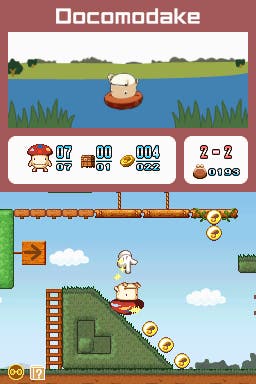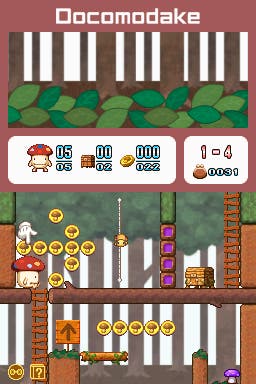Boing! Docomodake
Breaking the mould.
Unbeknownst to me until I was a great deal of my way through the game, Papa Docomodake, the paternal protagonist at the forefront of Boing! Docomodake, is a marketing tool for Japanese mobile operator Docomo. This is upsetting because had I known beforehand that this was a cynical merchandising tie-in, I would have been unlikely to show it the same attention, coloured as I am by a history of ill-informed and cynical student politics.
Boing! is a puzzle game in which problems are solved via the production of 'minis', tiny carbon-copies of the player-controlled mushroom Papa, which can be picked up with the stylus and dragged around the screen to perform various tasks. Tapping Papa releases a single mini, while the shoulder button peels off four. They can be stacked to make ladders, dragged onto platforms to weigh them down, popped into the outlines of blocks to form platforms, dropped onto other tiny mushroom switches to activate them, or rolled into balls to be hurled at the game's relatively sweet-natured enemies. Each mini that you produce also reduces the strength and weight of Papa, which is either advantageous or detrimental according to the situation.
Initially, the slimline Papa can only produce a few of these offspring, but by the end of the game he'll be sporting a possible 15. The minis can be dragged freely around the level, as long as they don't pass through any solid surfaces, and are quickly recalled to the father-lode via a quick double-tap on the open palm above Papa's head. Any damage done to Papa results in one of the minis becoming 'exhausted' and 'fainting', floating above their dad's head in a transparent, spectral fashion. Once Papa is down to zero minis, either because they're elsewhere or all exhausted, the next hit means game over. However, if you make it to the exit before all of your single-parent children are exhausted, you'll be promoted to the next level with all the minis restored.

Despite some collectable trinkets based on level-completion times, getting from the beginning to the end is the real meat of the sandwich, and so - moving Papa around with the d-pad, and controlling the minis with the stylus - players will be asked to overcome all sorts of typical puzzle obstacles, and these should be the, er, mustard. They're not particularly challenging obstacles, though. What you need to bear in mind is that Docomodake is a children's game. Its switch-and-balance puzzles, its basic memory tests, its non-aggressive enemies; none of these proves a massive obstacle to anyone with functioning 3D vision and a mental age of 8 or greater.
The game never ramps up the fiendishness of the mechanics to the level it potentially could. In terms of mechanics and charm there are obvious comparisons with the LocoRoco series, but there's nothing like the depth or challenge (which, at least in the challenge stakes, is saying something). It's unlikely that many of the levels will take more than a couple of attempts, and usually a quick glance around your environs with the handy 'look' button is enough to work out your path to the exit. One or two of the later stages forced me to restart when I realised I'd prevented a 100 per cent record, but on the whole I sailed through. It's also very short - each of the seven areas is home to seven levels, each taking no more than five or so minutes to complete. For a determined and competent player, Boing! Docomodake can be expected to stretch no further than four or five hours, and fewer if you don't stop to admire the scenery.

What scenery there is quickly becomes repetitive. Although each zone has its own particular geographical quirks, these are only cosmetic differences, and by the time you're an hour in you've pretty much seen all the game has to offer in terms of mechanics. There are control issues too. Stylus input can be inaccurate when picking up minis, which is typically frustrating during the very few taxing periods of play, and there are occasional problems using the shoulder buttons to shed multiple minis (something you do quite a lot, as the game forces Papa to shrink in order to navigate narrow passageways), because the quartet often overshoot the platform Papa stands on, or fling themselves onto spikes. They also drop out of view and your reach, necessitating a full recombine, removing minis from switches or destroying ladders. Finally, there's no way to check scores on particular levels, so if you miss a few coins and move on, you'll need to replay everything to be sure that you've hoovered them up.
But while they mount up, these are still relatively petty grievances. It's only really the brevity and ease of Boing! Docomodake that prevents it from scoring more highly. It's actually odd how quickly I became attached to Papa Docomodake and his family after years inured against cute by slaughtering monsters, aliens and prostitutes. There's a sense of guilt when one of them faints, and one of real warmth when he's reconvened with an errant relative [you soppy bastard - Ed]. For a game so clearly aimed at the younger generation, it's perhaps no surprise that there's an emphasis on family, gentleness and charm. What is surprising is how easily it penetrates cold and embittered black hearts, even if dear little Papa is a tool for the pigs in suits.








